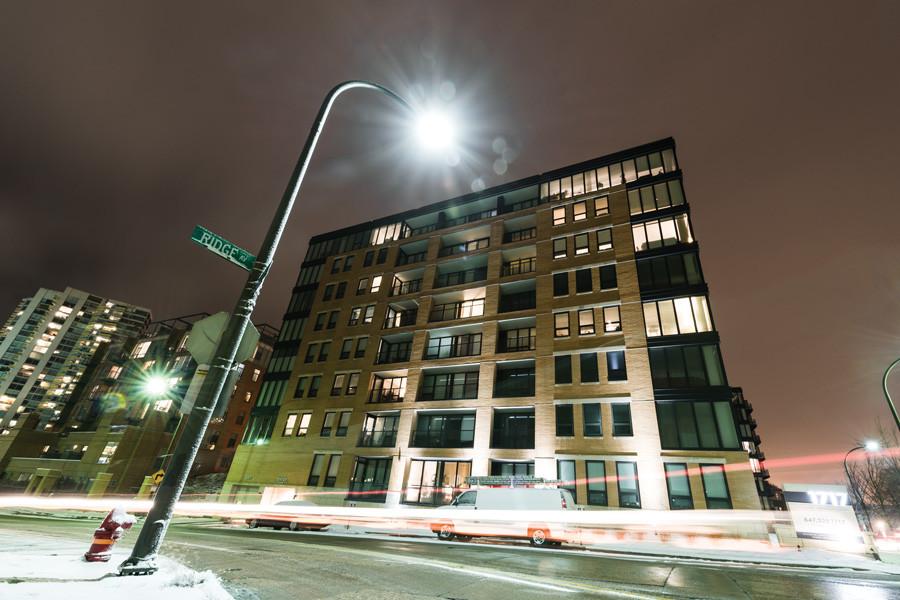Fair housing agency reaches settlement to improve accessibility standards in Evanston apartment
Jeffrey Wang/The Daily Northwestern
The architects of the 1717 Apartments, 1717 Ridge Ave., reached a settlement with fair housing nonprofit Open Communities to make the building more accessible to people with disabilities. The changes will be implemented over the next five years.
February 17, 2016
A local apartment building will become more accessible to residents with disabilities after the architects and a fair housing agency came to an agreement last month following a two-and-a-half year process.
The agreement — which will implement federal accessibility standards in the 1717 Apartments, 1717 Ridge Ave. — settled complaints that Open Communities, a nonprofit that aims to enforce fair housing in 17 Chicago suburbs, first filed with the U.S. Department of Housing and Urban Development in June 2014 and also with the Illinois Department of Human Rights in July 2014, according to a settlement.
In the summer of 2013, Open Communities sent undercover testers to the recently built apartments to determine if the building was compliant with Fair Housing Act standards, a method of systematic investigation for recently constructed buildings, Open Communities executive director Gail Schechter said. Amendments to the federal Fair Housing Act, which expanded the act to include protection for people with disabilities, were added in 1988 and apply to certain buildings built after 1991, Schechter said.
Open Communities’ complaints focused on the “failure” of 1717 Apartments’ developers, Focus Development, Inc. and Booth Hansen Ltd., to adhere to the Fair Housing Act, specifically accessibility for people with disabilities. Open Communities highlighted the building’s insufficient floor space to maneuver a wheelchair, high mailboxes unreachable for people in wheelchairs and lack of wheelchair ramps, according to the settlement.
Representatives from the 1717 Apartments and Focus Development, Inc. declined to comment, and attorney Scott Fradin, who represented Focus Development, Inc. in the settlement, as well as representatives from Booth Hansen Ltd. could not be reached for comment.
In the settlement, both Focus Development and Booth Hansen denied the discrimination allegations, but the companies settled the claims “to avoid the cost of protracted litigation.”
Despite the extensive process, the settlement allowed Open Communities to come to an agreement with Focus Development, Inc. and Booth Hansen Ltd. without having to go before a judge, Schechter said. Schechter added that the changes agreed upon in the settlement will be implemented over the next five years.
In addition to modifications made to address Open Communities’ complaints, the agreement states that Focus Development, Inc. and Booth Hansen Ltd. will each pay $87,500 in damages to Open Communities, according to the settlement.
“This is the biggest settlement we’ve had in over 25 years in Evanston,” said Jes Scheinpflug, a spokeswoman for Open Communities. “We’ve come such a long way with disability rights that people don’t pay attention to issues that make things not accessible.”
Schechter said failure to meet certain fair housing requirements does not fall on any single person because several levels of people, including architects, contractors, developers, owners and investors are involved in the construction process. Therefore, every member throughout every step of the construction process must be aware of standards set by the Fair Housing Act, she said.
Scheinpflug said oftentimes, however, people at every level of a building’s construction are not aware of the accepted handicap accessibility standards.
“For fair housing, when we see discrimination in 2016, the optimist in me likes to believe that it’s just because people don’t know any better, that landlords don’t know the laws, developers don’t know the requirements and they’re not doing it on purpose,” Scheinpflug said. “When we have settlements like this, it can let other developers know that this does exist, so in the future they are educated about fair housing.”
Schechter said she hopes this settlement will inform others about accessibility laws and standards to ensure that housing in Evanston and other suburbs remains inclusive in the future.
“It ended up being a protracted process, but we’re very happy with the outcome,” she said.
Email: julietfreudman2019@u.northwestern.edu
Twitter: @girlwhojumped



